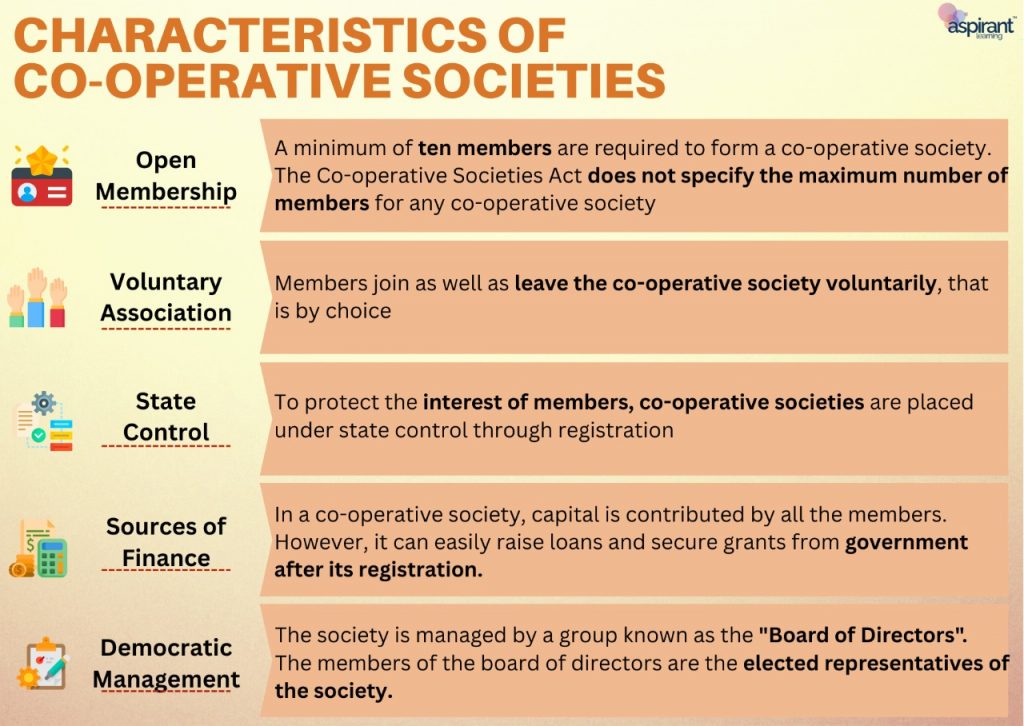News Highlight:
- Bill to amend the Multi-State Cooperative Societies Act introduced in Lok Sabha, aimed at bringing in transparency in the sector.
- Many Opposition MPs asked for the Bill to be referred to a Standing Committee for review arguing that it encroached on the rights of States.
Cooperative Societies:
- About:
- An independent group of people who have come together voluntarily to address their common economic, social, and cultural needs and goals through a jointly owned and democratically controlled enterprise is known as a cooperative society.
- The Co-operative Society is formed for the mutual benefit of all the members.
- When they work together they will have better bargaining power for buying and selling raw materials and agricultural output respectively.
- Features of a Cooperative Society:
- A cooperative society does not bind any member in its choice of association with itself. Anyone who wants to voluntarily enrol in such an organisation can do so irrespective of their caste or creed. They can end their association with the said group only by serving a notice declaring the same beforehand.
- Secondly, any member of the society can join a cooperative society irrespective of their caste, creed etc. the organisation does not restrict anyone on the basis of their social or religious background.
- In order to work smoothly and towards a common goal, the society forms a managing body by voting among its members. In this way, it is democratic in nature.
- The cooperative society, though it works independently, is always under the control of the state government. This means that it has to maintain all records and is accountable for its workings whenever it faces an audit.
- Constitutional Provisions:
- 97th Constitutional Amendment Act 2011
- The right to form cooperative societies is a fundamental right (Article 19).
- New Directive Principle of State Policy on the Promotion of Cooperative Societies (Article 43-B).
- A new Part IX-B to the Constitution is titled “The Co-operative Societies” (Articles 243-ZH to 243-ZT).

Cooperative Society Act:
- About:
- It attributes certain specific meanings to the terminology used to explain this act. Some of these are laws, committees, members, officers and registered society. It also states that the state government is entitled to appoint a registrar to look after a cooperative society’s workings and appoint people to assist the registrar. Any society that decides to work for its members with a common vested interest must be registered under this act.
- A society will be registered under this act only if it has a member count of more than ten persons who has attained the age of 18 years. The objective of the society is to create funds for its members. The word limited must be in use with the name of such cooperative societies. Any questions regarding the membership, such as whether the society has been created for agriculture or non-agricultural purposes, whether the residence of a member will be a town or village etc., will be taken by the registrar and deemed as final.
- Need for amendment:
- To strengthen governance, reform the electoral process, improve the monitoring mechanism, and ensure ease of doing business in multi-State cooperative societies.
- To improve the composition of boards and ensure financial discipline, besides enabling the raising of funds in the multi-State cooperative societies.
- Key amendments suggested:
- To establish a “cooperative election authority”.
- To make provisions for the “appointment of cooperative information officer”.
- To appoint one or more “cooperative ombudsmen” with territorial jurisdiction to inquire into members’ complaints.
- Insert a new Section related to the “establishment of the Cooperative Rehabilitation, Reconstruction and Development Fund” for the revival of “sick multi-state cooperative societies”
- Insert Section relating to “concurrent audit” for such multi-state societies with an annual turnover or deposit of more than the amount as determined by the Centre.
- The merger of “any cooperative society” into an existing multi-state cooperative society.
- Federal Issues concerning the bill:
- No provision of the Constitution makes way for merging a cooperative society, which is incorporated under State law with a Multi-State Cooperative Society.
- The Centre is indirectly encroaching on the rights of State Co-operative Societies through the introduction of the clause concerning the merger.
- Beyond the legislative competence of the Union as State cooperative societies are within the exclusive jurisdiction of States.
Pic Courtesy: The Indian Express
Content source: The Indian express



